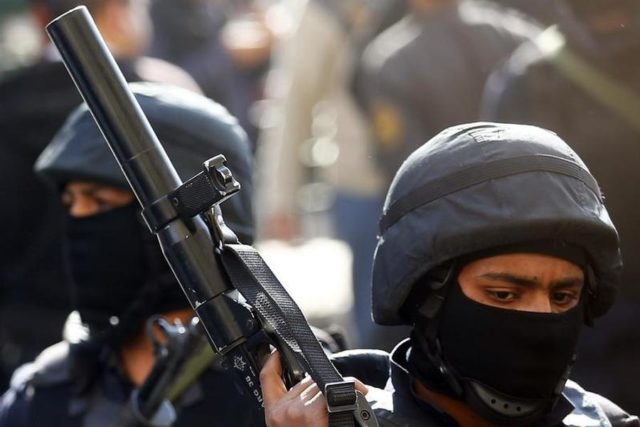
Briefs
Publication: Terrorism Monitor Volume: 15 Issue: 20
By:

Egypt: Hasm Movement Takes a More Islamist Tone
The Hasm Movement’s bomb attack on the Myanmar embassy in Cairo adds weight to claims that the group, which portrays itself as a nationalist movement intent on bringing down Egyptian President Abdel Fatah al-Sisi, may be developing a more overtly Islamist slant.
On September 30, an improvised explosive device was detonated at the Myanmar embassy in Cairo’s Zamalek district, causing damage but no casualties. Initial reports claimed the explosion was the result of a gas leak in an apartment.
In a statement released on Telegram following the blast, Hasm claimed responsibility for the attack, saying it was in response to events in Myanmar’s Rakhine State, where Muslim Rohingya are fleeing in the wake of a violent military campaign (Egyptian Independent, October 2; Egyptian Streets, October 2). The statement also attempted to draw parallels between the actions of the Egyptian government and the events in Myanmar, condemning a supposed “global silence” in both cases.
Two days later, police reportedly killed three alleged Hasm members in a gun battle and called for further raids on the group (Daily News, October 2).
The Hasm Movement has been careful to avoid civilian casualties in its attacks, preferring to target security officials and state institutions (see Terrorism Monitor, September 22). Although the blast at the embassy is in keeping with that to an extent — at least in respect of the care taken to avoid civilian casualties — it is a potentially significant development in terms of the group’s alignment and popular appeal.
The situation in Myanmar is not a uniquely Islamist issue, instead it has galvanized a diverse range of activists and experts, but the messaging behind the embassy blast lends more weight to the belief that the Hasm Movement is linked to the Muslim Brotherhood, a claim made by the Egyptian authorities, one which they are yet to substantiate (al-Monitor, October 15).
It is a belief that appears to be shared by Islamic State (IS), which accuses the Hasm Movement of pursing self-interested nationalist goals rather than “pure” jihad (SITE, October 4). IS’ disdain of Hasm stems in part from the Movement’s unwillingness to endorse IS attacks on Egypt’s Copts. IS fighters killed scores of people in separate suicide bombings on Coptic churches in Tanta and Alexandria in April (Daily Sabah, April 9).
Hasm condemned both of those attacks, but with the Myanmar embassy bombing and its play on the plight of the Rohingya, the Hasm Movement appears to be attempting to broaden its appeal and may be growing more Islamist in its outlook.
Mali: A Step Forward for the Peace Process
After months of clashes, a ceasefire deal between Malian rebels and the pro-government Platform militia is a positive development for Mali, but attacks by jihadists continue to undermine security.
On September 20, the Tuareg separatists of the Coalition of Azawad Movements (CMA) and members of the Platform militia signed a peace deal in Bamako (AfricaNews, September 22). The deal built on an earlier truce that had allowed Kidal State Governor Sidi Mohamed Ag Ichrach to return to the regional capital in northern Mali for the first time in several years (Sahelien, August 23).
The move is a boost for Mali’s stuttering peace process, but the gains remain tempered by jihadist violence. Even as the rebels signed their truce, there were a number of attacks on Malian soldiers and troops with the United Nations Mission in Mali (MINUSMA) (MaliActu, September 20). A second attack later in the month killed three MINUSMA Peacekeepers (MaliActu, September 24). Unsurprisingly, the government has extended for another year the state of emergency in Mali, which has been in place since November 2015 (MaliActu, October 21).
The Mali-Niger border area has also grown increasingly dangerous (Asharq al-Awsat, October 21). Over the border, the killing of four U.S. soldiers, along with four of their Nigerien counterparts, in an ambush near the village of Tongo Tongo in the Tillaberi region on October 4 adds to the concern (AllAfrica, October 5; MaliActu, October 6).
It appears to still be unclear exactly who the perpetrators of the attack were, and there are troubling suggestions that villagers may have been complicit by delaying the troops from leaving.
Possibly, it was the work of the local arm of IS, led by Abu Walid al-Sahrawi, the former spokesperson for the Movement for the Unity and Jihad in West Africa (MUJAO) (see Hot Issue, October 26). The group could be attempting to gain greater prominence. That in turn could bring them into conflict with the dominant al-Qaeda alliance, Jamaat Nusrat al-Islam wal Muslimeen (JNIM).
Earlier this month, jihadists with JNIM, which is led by the Ansar Dine chief Iyad Ag Ghali, released a video announcing they had executed local hostages as a warning to those who might collaborate with the security forces (aBamako, October 9). That tactic is more closely associated with IS, and if true could indicate an attempt to consolidate its position.
Positive steps in the peace process should allow the government to better focus on tackling the jihadists. The Sahel G5 force could help in that regard. The joint anti-terror effort between Mali, Niger, Burkina Faso, Chad and Mauritania is supposedly edging closer to becoming operational. The pace of developments, however, remains painfully slow.




